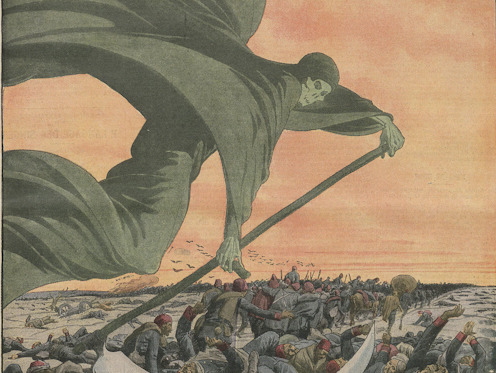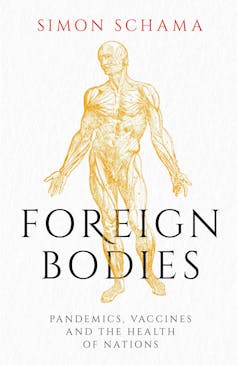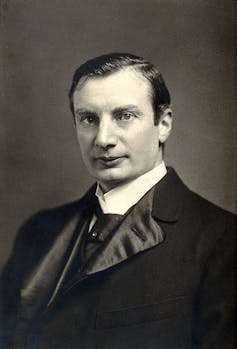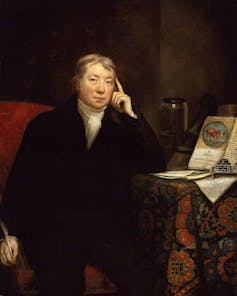
Pandemics. Quarantine. Vaccines. These concepts have been at the forefront of our minds for over three years now. Having lived through the height of the COVID pandemic, it would be easy for us to imagine we have just experienced something unique in human history.
In Foreign Bodies: Pandemics, Vaccines and the Health of Nations, Simon Schama illustrates that this is about as far from the truth as possible. He examines the reactions to outbreaks of smallpox, cholera and plague in the 18th and 19th centuries, focusing on some key individuals – people who are often left out of the grand narrative of scientific progress.
Review: Foreign Bodies: Pandemics, Vaccines and the Health of Nations – Simon Schama (Simon & Schuster)
Schama specialises in Jewish and French history, and some have suggested he is not necessarily the right person to write a history of public health responses to diseases of pandemic proportions. But as a historian of medicine and public health, I find it quite revolutionary to see a historian of Schama’s ilk examining the field.
I was ten years old when I watched his BBC series A History of Britain. It was the first time in my life I genuinely understood that history was something that can never truly be “known”, but was something to be studied and interrogated for its nuances and hidden stories. To read Schama writing about an area of history I am personally invested in is genuinely exciting.

In Foreign Bodies, Schama demonstrates that the histories of medicine and public health are deeply entwined with broader understandings of social history. He shows that, far from being a separate field of study, some of the “big picture” histories readers associate with him have indeed been heavily influenced by disease outbreaks and the reactions to them.
By leading the reader through broad sweeps of history, featuring relatively well-known figures and events, Schama places the histories of vaccinology and other advances in medicine and public health in their broader content. This is what Schama does best: he uses the macro history to highlight the intricacies of the micro histories.
The ‘other’
One of the striking themes in Foreign Bodies is Schama’s acknowledgement of the parallels between our ancestors’ responses to outbreaks of new and terrifying diseases and the ways we have sought to place the blame for COVID. We have a natural tendency to look for an “other” to blame – people from other cultures that we do not truly understand.
This is exemplified by Waldemar Haffkine, the central figure in much of Schama’s narrative. Of Jewish origin, Haffkine was the “other”: a person whose ancestors have often borne the blame for pandemics throughout European history. In the 14th century, for example, at the time of the Black Plague, it was believed that Jewish people were poisoning wells. There were trials and executions as the suffering populations sought desperately to find a reason for the cruel fate that had befallen them.

Schama turns this narrative on its head. He highlights the substantial role of individuals like Haffkine in advancing revolutionary science. Haffkine is the hero of the story: a talented and dedicated scientist, who revolutionised the fields of immunology and vaccinology through his work to vaccinate the population of India against cholera and plague. Through Haffkine, Schama demonstrates that some of the greatest advances in medical science come not from the core of the medical establishment, but rather from those on the periphery.
As Schama indicates, however, Haffkine still had to earn the patronage of more well-known members of the medical establishment. This came in the form of Sir Joseph Lister, the famed pioneer of antiseptics in surgery. That it was necessary for Haffkine to gain the support of such an influential figure to establish his worth as a scientist highlights the intersection of medical science and politics.
À lire aussi : Diseases gave us the rise of Christianity, the end of the Aztecs and public sanitation. How might future plagues change human history?
Inoculation
Another key example in Foreign Bodies is the pioneering work of Lady Mary Wortley Montagu, an English aristocrat whose husband was appointed ambassador to the Ottoman Empire in the 18th century.

During her time in Turkey, Lady Montagu was exposed to the traditional practice that would come to be known in European medical circles as inoculation (or variolation). This was the practice of deliberately infecting children with smallpox in order to induce a mild case of the disease, preventing them from contracting the virus naturally and suffering its disfiguring and potentially fatal effects.
Lady Montagu had been disfigured by an attack of smallpox herself. She sought to protect her own children from suffering the same fate. In doing so, she introduced English high society to the concept of inoculation.
This is yet another case of the “other” – a woman – revolutionising the way in which medicine was practised. And in this case, the “othering” is even more evident. Inoculation was seen as counterproductive to many in the English medical establishment and viewed with suspicion in broader society. Many resisted the notion of deliberately infecting children with a potentially deadly disease. The suspicion was compounded by the fact that Lady Montagu had brought the practice back to Europe from Turkey.
Schama highlights that the form of inoculation Lady Montagu introduced to English society was not, in fact, an entirely new concept within the British Isles. He touches on the fact that versions of inoculation were already practised in Wales and the Scotish Highlands. According to Schama, this helped the wider medical establishment to accept the practice – once they had noted that inoculation was not truly “foreign”, but in fact “home-grown” to some extent.
À lire aussi : To prepare for future pandemics, we can learn from the OECD's top two performers: New Zealand and Iceland
Medicine and politics
Schama’s examination of smallpox prophylaxis in Europe ends before Edward Jenner’s discovery of vaccination in 1796, which substituted the less-dangerous cowpox virus for smallpox in the inoculation procedure. That is a different story, however, to the one Schama is telling.

Foreign Bodies is heavily invested in the history of the intersection of medicine and politics. Schama examines the role of the great European powers of the 18th and 19th centuries in the management of pandemics and the proliferation of life-saving medical procedures, such as vaccination. Central to this narrative is the acknowledgement that, while our medical knowledge and the acumen of our public health regimes have improved drastically since the times of Haffkine and Lady Montagu, the political issues have hardly changed.
The parallels between the ways in which previous generations sought to blame the “other” and the ongoing suspicion that COVID may have artificial origins are obvious throughout. Schama’s reflections on the ways people reacted to outbreaks of cholera, plague and smallpox show that we have never truly lost our suspicion of the “other”, nor have we grasped the notion that humanity generally brings these pandemics upon itself.
There is a link between continuous economic expansion and the rise of epidemic diseases, sometimes to pandemic proportions, and it is fascinating to read Schama reflecting on this theme throughout Foreign Bodies.
Perhaps the most striking example is the British unwillingness to heed public health warnings during the opening of the Suez Canal, when they refused to implement basic quarantine principles in the wake of a cholera outbreak. Of course, the rules of quarantine did apply to non-European travellers, as Schama demonstrates, indicating once again where the blame was being squarely placed.
There is an extensive list of disease outbreaks that Schama could have chosen to explore this concept. One of the most obvious examples would be the Spanish Flu pandemic that followed World War I. The “Spanish Flu”, as it came to be called – despite the fact its place of origin is uncertain – carries many of the same “othering” tropes and perhaps most closely resembles COVID in this regard.

It would be impossible for Schama to incorporate every pandemic into this one volume. His choice of three of the most feared epidemic diseases in history – smallpox, cholera and plague – is enough to demonstrate his point. The choice covers viral (smallpox) and bacterial (cholera and plague) diseases at critical points in their history, when globalisation was spreading new strains between previously disparate populations.
At the core of Foreign Bodies is Schama’s understanding that “all history is natural history”. No matter how much we believe our knowledge and our technological capabilities have evolved, we are still at the mercy of the natural world.
COVID has only further demonstrated this point, as Schama notes in his reflections on the pandemic. Quarantined, away from the bustle of regular life, he reflects in his prologue on the way nature quickly reclaimed territories that we have moulded and shaped for our own needs – the cities, the suburbs, even the carefully curated and manicured green spaces that surround us.
Schama shows that pandemics are an ongoing feature of our existence on this planet. He also provides a devastating insight into our likely future responses to disease outbreaks. If you want to believe scientific knowledge will eventually prevail, he observes, “it is probably best not to ask a historian”.
Foreign Bodies provides a perhaps bleak, but truthful, view of our world today, as we continue to struggle with COVID and anticipate the looming threat of whichever disease will become the next great pandemic.
Ella Stewart-Peters ne travaille pas, ne conseille pas, ne possède pas de parts, ne reçoit pas de fonds d'une organisation qui pourrait tirer profit de cet article, et n'a déclaré aucune autre affiliation que son organisme de recherche.
This article was originally published on The Conversation. Read the original article.







